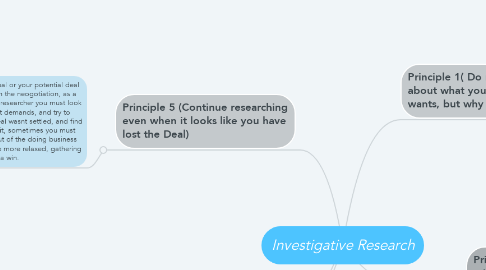Investigative Research
by Julian Serrano

1. Principle 3 (interpret the demands as opportunities).
1.1. This teaches us that we can learn from the insistence of our counterpart, what are these demands, and what are those demans giving me information about what they are looking forward to them, and settle an even better arrangement, TO take the demands and turn them into opportunities.
2. Principle 4( Create a shared ground with your opponents)
2.1. This meaning that not always you have to compete with your counterparts, but if you seek and found any way of cooperation, do it so this way you might reduce cost and even be more profitable, in resume, try to look for opportunities with your counterparts, instead of rivalities.
3. Principle 5 (Continue researching even when it looks like you have lost the Deal)
3.1. Even when your ideal or your potential deal you cant give up on the neogotiation, as a good investigative researcher you must look into the counterpart demands, and try to find out why the deal wasnt settled, and find the way of settling it, sometimes you must look information out of the doing business time, when they are more relaxed, gathering information is also a win.
4. Principle 2(try to understand and mitigate the limitations of the other party).
4.1. Here is where we are limited where the negotiation can become a problem for us because we must understand that the part has limitations and is not according to what we offer, but when they disagree is a signal that is acting for their own interest, but through an investigation can help to mitigate the limitations of the other party, where it can provide advantages.
5. Principle 1( Do not talk only about what your counterpart wants, but why they want it).
5.1. This principle can be used in complex negotiations between various parties. As a united states example had payments expired us $ 1 Billion to the ONU,but the United States wanted a reform in some thing and where the united states wanted to pay less to the regular budget of the ONU, then this position of United States did not serve to the ONU and wanted to know why the reason to pay less, but the ONU understood that it could not generate an increase to other countries and agreed was the coordination of payments with the amounts and with this each party could follow what he wanted to achieve.


